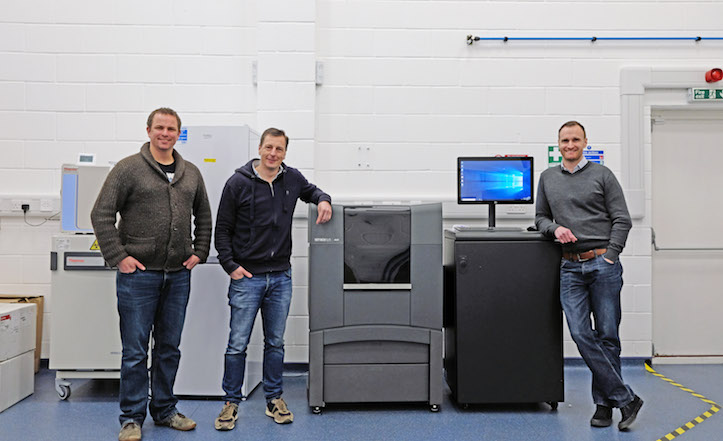Company’s entire business model and strategic goals built around the unique advantages of Stratasys full-color, multi-material 3D printing
UK-based BiologIC Technologies has installed Stratasys’ new full-color, multi-material J826 3D Printer to spearhead its mission to transform synthetic biology – the field of science that involves redesigning organisms for useful purposes by engineering them to have new abilities. The installation of the J826 makes the Cambridge-based company the first in the UK – and one of the first in Europe – to deploy Stratasys’ most recent addition to its J8 Series of PolyJet 3D printers.
The BiologIC team is currently developing a digital bio-processing unit designed to speed up laboratory processes which, it hopes, will provide greater benefits from the latest breakthroughs in food, fuels and medicines. Once finalized, BiologIC plan to also manufacture the device – potentially in their thousands – using Stratasys’ J8 Series technology.
According to BiologIC, engineering biology is conventionally a complicated and expensive process, requiring large laboratories and highly skilled scientists mixing and moving liquids to different robots that undertake specific, sometimes repetitive tasks. The team’s end-goal is to condense that whole process and create a digital ‘lab in a box’ that significantly simplifies existing processes – similar to the way in which large mainframe computers eventually gave way to smaller, more efficient desktop PCs.
Using 3D printing to create biology by design and on-demand
“Our ‘lab in a box’ draws inspiration from advances in 3D printing and the semiconductor’s long and successful history,” said Nick Rollings, Co-founder of BiologIC. “Importantly, our instrument could be used to create biology by design and on-demand, whether it’s to treat patients on-site or make the latest biofuels. We believe this device will enable the next industrial revolution.
“But the cost and time implications of creating such a device and bringing it to reality with a working prototype was the stumbling block. Ultimately, 3D printing was the technology capable of overcoming this problem. Indeed, without the J826, we wouldn’t be moving ahead as a company as we wouldn’t have a product,” he continues.
The beating heart of BiologIC’s proposition is a 3D printed ‘bio-processing unit’, which automates a number of complex biological processes using many different elements and materials. This, explains Rollings, would simply be impossible to create using any traditional methods.
Multi-material functionality key to design
“The design freedoms delivered by full-color, multi-material 3D printing enables us to accelerate our design process with zero restrictions,” Rollins says.
“Indeed, having this capability is what allowed us to even achieve the complexity of the current design.”
The ability to print in the Vero Ultra Clear™ material, for example, with its glass-like clarity, is essential for visualization of the cartridge’s inner workings so that scientists can check the biology is of high quality and performing as designed. Within the structure, the precision movement of fluids is key to controlling the biology, and the ability to print in flexible photopolymers like Agilus30 and other digital materials has allowed the company to add a level of functionality within its bio-processing unit that would have been impossible without this material.
The design of this unit, around the size of a Rubik’s Cube, currently combines four materials, but the team hopes to utilize the full eight-material potential of the J826 in the future.
It is not just the technological capabilities that have been essential to helping BiologIC realize their vision, but the business potential too. According to Richard Vellacott, Co-founder of BiologIC, 3D printing has enabled the team to turn the traditional life-sciences business model on its head.
“With our in-house J826, we can build and test cartridges constantly, and show potential customers and investors our rapid development process in real time. This is something unachievable with other traditional life science R&D processes. This flexibility has led directly to our early adopter program with other high-science and biology companies, resulting in faster innovation and greater success overall,” Vellacott explains.
Cost-effective access to ‘best in the game’ 3D printing technology
All three co-founders pride the business on its ability to be agile. Colin Barker, another of the company’s co-founders, explains that the trio investigated and selected a technology that could both physically and economically slot into its business model.
“Our priorities as a start-up meant we needed a technology that enabled us to be lean and agile. Stratasys’ PolyJet 3D printing is the best in the game, so importantly the J826 gave us access to this technology at a price point and physical size attractive for a start-up,” Barker explains.
Currently in the R&D process, the trio are aiming for a future in which their business model can completely exploit the key benefits of 3D printing, namely manufacturing such cartridges on-demand at a price point and at a significant scale that benefits many customers and society as a whole.
“With the huge increase in our ability to read and write DNA over the past ten years, the next decade will see us unlock the potential to apply and scale this knowledge. This new era of biology by design will create significant disruptive value across many industries and will help solve some of the biggest issues of today, including climate change, environmental sustainability and better health through new foods, fuels and precision medicines,” concludes Vellacott.
www.stratasys.com

 Deutsch (Germany)
Deutsch (Germany)  Polski (PL)
Polski (PL) 









